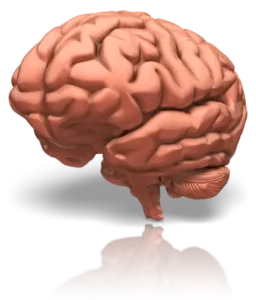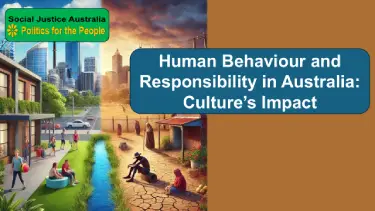Description: Human Behaviour
How do culture and environment shape human behaviour in Australia? Discover how Australia can build a more compassionate society using its economic sovereignty.
Introduction
Australia, often celebrated for its “fair go” ethos, often blames individuals for social issues like crime, poverty, and unemployment. This perspective ignores the broader environmental and cultural influences that shape behaviour. By examining scientific research and real-world examples, we can better understand how behaviour develops and how Australian society can use its economic sovereignty to create lasting, positive change.
The Problem with Blaming Individuals in Australia
In Australian society, the idea that people are solely responsible for their successes and failures is deeply ingrained. This belief manifests in public discourse, where narratives around “hard work” versus “laziness” often dominate discussions about welfare, employment, and crime. This view not only oversimplifies complex issues but also perpetuates harmful stereotypes that hinder social progress.
– Statistics: The Australian Institute of Health and Welfare reports that people from lower socio-economic backgrounds are more likely to engage in criminal behaviour, not because of inherent flaws but due to systemic disadvantages.
– Story: Consider a young person growing up in a remote Indigenous community. Limited access to education, healthcare, and job opportunities creates a cycle of poverty and disconnection. When this young person engages in petty crime out of necessity, society blames them rather than addressing the root causes.
Autonomy and Accountability in the Australian Context
The idea of autonomy suggests that individuals have complete control over their actions and are entirely accountable for their life circumstances. However, this notion does not consider structural inequities in Australia. For example, young Australians in rural areas face significantly fewer opportunities compared to those in major cities. The idea of “pulling yourself up by your bootstraps” becomes meaningless when systemic barriers prevent equal access to resources.
Cultural Conditioning in Australia
Cultural conditioning plays a significant role in shaping behaviour. In Australia, social norms and values are set up from an early age. Children from affluent suburbs may grow up believing they can achieve anything, while those from underprivileged areas may be conditioned to accept limited life prospects. This cultural divide creates lasting impacts, influencing everything from educational attainment to interactions with the justice system.
– Example: A child raised in a household that emphasizes academic success and offers private tutoring will perform better in school compared to a child whose parents are working multiple jobs just to make ends meet.
The Determinist Perspective on Human Behaviour
From a scientific standpoint, human behaviour is not random but is influenced by prior experiences and environmental factors. The determinist view holds that behaviour is lawful, orderly, and shaped by upbringing. In Australia, this is clear when examining how crime rates correlate with socio-economic conditions.
Scientific Viewpoint on Behaviour
Determinism is backed by research in neuroscience and psychology, which shows that our environment plays a pivotal role in shaping who we become. Brain plasticity, the brain’s ability to change based on experiences, supports this theory. When people live in stressful environments—such as those with high crime rates, poor educational resources, or unstable housing—their brain development is affected, often leading to maladaptive behaviours.
Case Studies of Environmental Influence in Australia
– Substance Abuse in Rural Australia: Regions like regional Victoria and Far North Queensland have alarmingly high rates of substance abuse. This issue is often a result of economic despair and a lack of access to mental health resources, not a lack of willpower or moral failing.
– Indigenous Disadvantage: Indigenous Australians face disproportionate rates of incarceration. This is not because of any inherent criminality but due to a legacy of colonization, social exclusion, and intergenerational trauma. Addressing these issues requires systemic change, not punitive measures.
How the Brain Adapts to Its Environment
 The human brain is incredibly adaptable, continuously shaped by the environments we live in. This phenomenon, known as brain plasticity, explains why people raised in supportive, stable environments tend to thrive, while those exposed to chronic stress may struggle.
The human brain is incredibly adaptable, continuously shaped by the environments we live in. This phenomenon, known as brain plasticity, explains why people raised in supportive, stable environments tend to thrive, while those exposed to chronic stress may struggle.
The Role of Brain Plasticity
Our cerebral cortex, responsible for complex thinking and decision-making, evolves as we learn from our surroundings. Children exposed to elevated levels of stress, such as seeing domestic violence or living in poverty, experience changes in brain development that can lead to anxiety, impulsivity, and a higher likelihood of engaging in risky behaviour.
– Scientific Insight: Research by Australian neuroscientists has shown that early childhood experiences are crucial in brain development. Investment in early intervention programs, such as quality childcare and family support, could prevent many behavioural issues later in life.
Examples of Learning and Adaptation in Australia
 – Language and Cultural Learning: In multicultural Australia, children adapt quickly to diverse linguistic and cultural environments. This adaptability shows the brain’s incredible plasticity.
– Language and Cultural Learning: In multicultural Australia, children adapt quickly to diverse linguistic and cultural environments. This adaptability shows the brain’s incredible plasticity.
– Urban vs. Remote Living: Australians living in remote areas develop unique survival skills to adapt to their harsh surroundings. However, these adaptations can sometimes limit their opportunities when moving to urban settings, showing how environmental influences can shape life paths.
Environment vs. Genetics in Shaping Behaviour
While genetics do play a role in behaviour, the Australian experience highlights the overwhelming influence of environment. Issues such as poverty, lack of educational access, and intergenerational trauma often outweigh genetic predispositions.
Malleability of Behaviour in Australian Society
Behavioural scientists in Australia emphasize that environmental factors, like quality education and stable housing, have a far greater impact on life outcomes than genetics. When children have access to supportive environments, their behaviour and academic performance improve significantly.
Comparative Analysis of Upbringing
Imagine the difference between a child raised in a wealthy Sydney suburb, with access to top-tier schools and extracurricular activities, and a child growing up in a disadvantaged area of regional New South Wales. The gap in opportunities creates a divide that often persists into adulthood, affecting everything from career prospects to health outcomes.
The Role of Environment in Moral Development
Moral values are shaped by the environment, not by genetic predisposition. In Australia, this is clear when comparing affluent suburbs with lower socio-economic areas. The social and moral codes in these communities are often worlds apart, driven by the necessity of survival rather than inherent moral flaws.
Morality and Upbringing in Australia
Australia’s cultural emphasis on “mateship” and a “fair go” influences moral development. However, systemic inequality makes it difficult for some to live by these values. When individuals are raised in environments where crime is normalized or seen as a necessity for survival, their moral compass adapts accordingly.
Event-Driven Behavioural Change
Behavioural changes are often triggered by significant events. In Australia, natural disasters like bushfires have shown how communities can quickly adapt, displaying generosity and unity. However, the stress from these events can also worsen issues like mental health struggles and domestic violence.
Crime, Law, and Societal Conditions
Australia’s approach to crime often focuses on punishment rather than prevention. Despite “tough on crime” rhetoric, this strategy has not led to long-term reductions in crime rates. Instead, it disproportionately affects marginalized communities.
The Ineffectiveness of Punishment in Australia

Studies reveal that punitive measures do not address the root causes of criminal behaviour. Recidivism rates are still high, particularly among Indigenous Australians, who are often criminalized for minor offenses. Redirecting resources from prisons to social services could yield better outcomes.
Real-World Examples
– Juvenile Detention: Indigenous youth, making up just 6% of Australia’s youth population, account for over 50% of those in detention. This is a result of systemic failures, not individual moral shortcomings.
– Survival-Driven Crime: Rising housing costs and economic pressure have led to an increase in welfare fraud and petty theft. People are not committing these acts because they want to but because they are desperate to provide for their families.
Economic Priorities and Social Well-Being
Australia’s budget allocations reflect its priorities, with significant investments in defence and subsidies for fossil fuel industries. Meanwhile, essential social services like housing and healthcare remain underfunded. This imbalance contributes to social inequality and drives negative behaviours.
Discrepancy in Government Spending
It’s telling that Australia can easily find billions for defence deals, like AUKUS, but struggles to distribute sufficient funds to address homelessness. Public money is often used to secure the nation’s borders rather than ensuring the well-being of its citizens.
Questioning Social Priorities
Imagine if a fraction of defence spending were redirected to education, mental health, and affordable housing. Studies show that investing in social infrastructure pays long-term dividends, reducing crime and improving quality of life.
Indoctrination and Power Structures in Australia
Australian society is shaped by powerful structures that influence public perception and support the status quo. These structures, including media conglomerates and political elites, have a personal stake in keeping the public focused on individual responsibility rather than systemic change.
Perpetuating Power Through Values
Australian institutions, from schools to the media, often promote values that help the powerful. For instance, discussions about welfare often focus on “dole bludgers” rather than addressing systemic job scarcity. This narrative keeps attention away from the failures of public policy.
The Impact of Indoctrination
 Media representation plays a huge role in shaping public opinion. Stories that highlight welfare fraud are more likely to make headlines than stories about corporate tax evasion. This selective narrative reinforces harmful stereotypes and perpetuates inequality.
Media representation plays a huge role in shaping public opinion. Stories that highlight welfare fraud are more likely to make headlines than stories about corporate tax evasion. This selective narrative reinforces harmful stereotypes and perpetuates inequality.
Pathways to Change and Improvement in Australia
To build a fairer society, Australia must focus on addressing systemic issues rather than punishing individuals. Policies should promote social well-being and give everyone an equal opportunity to thrive.
Shifting Focus from Punishment to Support
Investing in programs that address the root causes of crime, such as poverty and lack of education, could transform communities. For example, evidence-based initiatives like “justice reinvestment” redirect funds from the prison system into community support services, with promising results.
Encouraging Societal Change
– Action Steps: Advocate for policies that promote economic equality, such as universal basic income or increased public housing.
– Community Efforts: Support grassroots movements and local charities that work to uplift marginalized communities. Initiatives like “Closing the Gap” aim to reduce Indigenous disadvantage but require widespread support to be effective in changing human behaviour.
Conclusion
The Australian tendency to blame individuals for societal issues and human behaviour ignores the powerful impact of environmental factors. To create a fairer and more compassionate society, Australia must recognize its economic sovereignty and invest in systemic change that addresses the root causes of inequality.
Question for Readers
What societal changes do you believe would help Australia better support its most vulnerable citizens? Share your thoughts in the comments below.
Call to Action
If you found this article insightful, explore more about political reform and Australia’s monetary sovereignty on Social Justice in Australia: https://socialjusticeaustralia.com.au/. Share this article with your community to help drive the conversation toward a more just and equal society.
Click on our “Reader Feedback” menu. Let us know how our content has inspired you. Submit your testimonial and help shape the conversation today!
Additionally, leave a comment about this article below.

